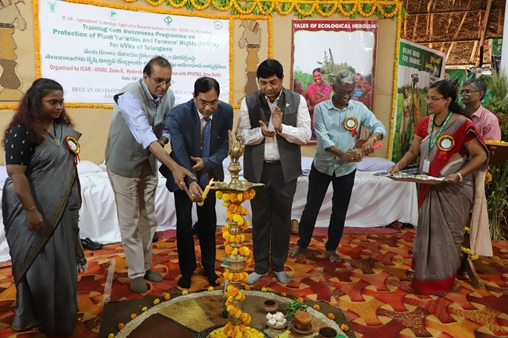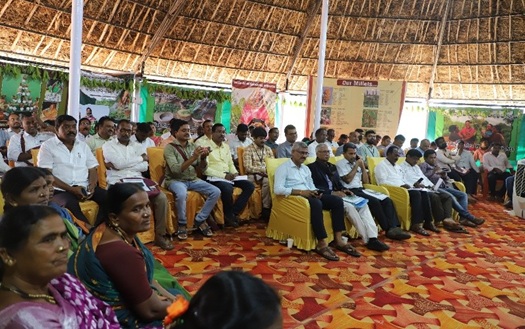28th February 2025, Hyderabad
ICAR-Agricultural Technology Application Research Institute, Hyderabad, in collaboration with the Protection of Plant Varieties and Farmers' Rights Authority (PPVFRA), New Delhi, organized a training-cum-awareness programme on the protection of plant varieties and farmers' rights for KVKs of Telangana today, at DDS Krishi Vigyan Kendra, Zaheerabad.

The Chief Guest, Dr Trilochan Mohapatra, Former Director General (ICAR) & Chairperson, PPVFRA, New Delhi, lauded the DDS women farmers for conserving 40 traditional seed and crop varieties, emphasizing the importance of preserving small grains for future generations and organic farming.
Dr Shaik N. Meera, Director, ICAR-ATARI, Hyderabad, discussed the mandatory registration of traditional crops. He highlighted the advantages of registration under this act for KVKs and emphasized how it helps prevent bio-piracy.

In the historic Deccan region of Telangana, over 5,000 Dalit and tribal women from 50 villages in Zaheerabad have been actively involved in conserving more than 80 indigenous seed varieties. To recognize their efforts, an event was held at Deccan Development Society - Krishi Vigyan Kendra (KVK, Medak 1), which collaborates with these communities to promote sustainable farming practices.
The programme, attended by scientists and farmers from 16 KVKs across Telangana, gathered 140 participants. Its primary goal was to raise awareness about the importance of registering the traditional seeds these farmers have been preserving, including millets, pulses, cereals, and horticultural crops, and to facilitate their legal protection under the PPVFR Act, 2001.
As a result, 100 applications for the registration of farmers' varieties were initiated, and 23 farmers were felicitated for their dedication to conserving traditional seed varieties.
(Source: ICAR–Agricultural Technology Application Research Institute, Zone X, Hyderabad)








Like on Facebook
Subscribe on Youtube
Follow on X X
Like on instagram